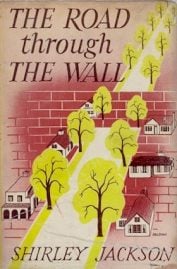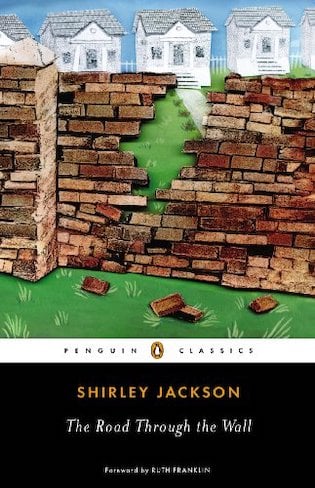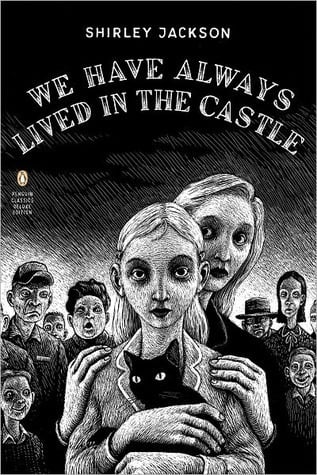The Road Through the Wall by Shirley Jackson (1948)
By Francis Booth | On May 14, 2021 | Updated June 17, 2023 | Comments (0)

The Road Through the Wall was Shirley Jackson’s first novel (1948). That was also the year when her short story, “The Lottery,” was published, making her instantly famous (as well as infamous). This plot summary and analysis of The Road Through the Wall focuses on its young heroine, Harriet Merriam.
Jackson claimed that the novel was loosely based on her childhood growing up in a well-to-do neighborhood in California. Admitting that this book was somewhat of a revenge novel, she asserted that a first novel’s purpose, after all, was to get back one’s parents.
Excerpted from Girls in Bloom: Coming of Age in the Mid-20th Century Woman’s Novel by Francis Booth, reprinted by permission.
Though a solid first novel, it moves along ploddingly until the shocking climax, scarcely hinting at the brilliance and suspense of Jackson’s later works. Reviews were generally favorable when the book was first published.
Saturday Review (February 28, 1948) wrote that “the story is a good one, set down with neither hope nor despair. It is the story of Sidestreet, USA, where the children reflect the life of their parents with its bickering futility and its moral bankruptcy.”
The Montreal Gazette (May 28, 1948) wrote: “Miss Jackson is no Sinclair Lewis; she is only 28. But she doess show a remarkable talent for putting on paper the everyday happenings which at times make life a pleasure and sometimes make it pretty grim.”
Introducing Harriet Merriam
As in several of Jackson’s stories and novels, we do indeed see the world – and in this case Pepper Street is its own world – largely through children and their mothers; Jackson didn’t – possibly couldn’t – ever write a sympathetic male character.
Fourteen-year-old Harriet lives in a middle-class suburb in California – not completely unlike the one where Jackson herself was born – where everyone knows everyone else’s business. This a chamber piece where many characters have an equal part and Harriet is simply one of the actors in the drama. Nevertheless, she is drawn in great detail and the novel does show her awkwardly coming of age, at least in one sense.
Like many fictional teen heroines, Harriet wants to be a writer. She considers herself dumpy, unattractive and awkward; Jackson herself was consistently overweight – at the age of forty she weighed over 200 pounds – and by no means conventionally beautiful or glamorous even in her publicity photos; she creates Harriet with obvious love and a great deal of empathy.
“Harriet was a big girl, large-boned and stout, and Mrs. Merriam braided Harriet’s hair every morning and dressed her in bright colors. For the last year or so, from twelve to almost fourteen, Harriet had begun to speak awkwardly when she was uneasy, missing her words sometimes, and stammering.”
Trouble with Mother
Her mother confides to a friend that she worries about Harriet, “about her being so heavy, I mean. It’s very hard on a girl.” Harriet does not join in with the other children playing “baseball or tag or hide-and-seek, actually because she was fat and the other children made fun of her, ostensibly because her mother had forbidden her to play.’
She tells her friends that she has “a sort of weak heart … My mother thinks and the doctor thinks I shouldn’t do much running around like the other kids.” Jackson herself died of a heart attack in her forties.
Harriet’s trouble with her mother starts when, following other girls in her class, she writes a letter to a boy which only the most prudish of mothers, even in the 1940s, would consider risqué.
Unfortunately for Harriet, her mother is one of those mothers. Harriet has chosen to write to George “because he was dull and unpopular and she felt vaguely that she had no right to aim any higher than the one boy no one else would have.”
Harriet had not sent the letter, nor even finished it. It begins, “Dearest George,” and continues, “Let’s run away and get married. I love you and I want to – “ The letter ends here because “Harriet had not been able to think of what she wanted to do with George.”
Her friend Helen’s letter had ended “kiss you a thousand times’ but Harriet ‘could not bring herself to write such a thing, at least partly because the thought of kissing George Martin’s dull face horrified her.”
Harriet sees that her mother has been looking through her desk drawers, a private world which contains her notebooks labelled, respectively, Poems, Moods, Me and Daydreams. The mothers of the various girls are appalled to various degrees at this wanton, lustful collective display on the part of their daughters. Harriet’s mother is distraught.
. . . . . . . . .

Girls in Bloom by Francis Booth is available on Amazon US & Amazon UK*
Girls in Bloom in full on Issuu
. . . . . . . . .
Making amends
Harriet’s mother soon comes down and “Harriet felt at last like crying. She loved her mother again, as one should love a mother, tenderly and affectionately. She put her arm around her mother and kissed her. ‘I’m sorry,’ she said.”
Her mother says to Harriet: “We’ll spend more time together from now on. Reading, and sewing. Would you like to learn to cook, really cook?” She even offers to help Harriet write her poetry. “I used to write poetry, Harriet, not very well, of course, but that’s probably where you get it.”
Her father insists that she shows her mother everything she writes; Harriet, earnestly, says she will. Harriet’s father is not at all close to his daughter and has no idea what is going on in her life. Unlike Natalie Waite’s father in Jackson’s Hangsaman, he has no interest in literature or his daughter’s interest in it.
Real-life and literary friends
Harriet’s friend Virginia very nearly leads her into serious trouble when she takes Harriet with her to the apartment of a Chinese man she has met on the street.
Harriet has been nervous of doing anything her mother would not approve of and wants to go the long way home so they will not run into him but Virginia tells her, “if you’re going to be scared all the time and always be wanting to go around the other way and afraid of your mother and everything I’ll just go on down to the store by myself and not talk to you anymore.”
Harriet doesn’t know what to do, she doesn’t want to go into the apartment but “she couldn’t let Virginia go alone, and never be friends again afterward, but once inside they were no longer right where they could call for help.” She tries to stop Virginia. “We can’t go in, Ginnie. My mother.”
The girls do go inside but nothing bad happens, except that they discover the Chinese man is simply a servant in the apartment and the owners are away.
Afterwards she is nervous that Virginia will let slip something to her mother and is hoping that the family moving into the vacant house on the street may provide a new friend for her to replace the risky Virginia. Harriet quite naturally sees the world in terms of Little Women, though unusually, she does not want to be Jo.
Perhaps one of the new girls who would live in the house – they would be like in Little Women, and Harriet’s friend would be Jo (or just possibly Beth, and they could die together, patiently) – would love and esteem Harriet, and some day their friendship would be a literary legend, and their letters …
. . . . . . . . . . .

Six Novels by Shirley Jackson: Psychological Thrillers by a Master
. . . . . . . . . . .
A bond with Marilyn
Harriet’s mother would presumably be apoplectic if Harriet were to read Vanity Fair. Marilyn tells Harriet about the girls she does not like, including Virginia. “She’s not much,” says Harriet and in “a final recognition of her bond with Marilyn,” she says, “I know something about her.”
Marilyn is from the only Jewish family in the neighborhood. Harriet’s parents are not at first especially anti-Semitic, and the subject only arises in relation to readings of Shakespeare that are being organized; someone mentions that it might be insensitive to read The Merchant of Venice with Marilyn present.
Eventually, Harriet’s parents tell her she must not see Marilyn again but not before the to girls have become close, especially in their literary tastes.
One time, Marilyn is talking about reincarnation; she tells Harriet that she might have been Becky Sharp before she was Harriet Merriam, even though Harriet is far closer to Emmy Sedley than to Becky, who is more like Virginia.
‘“Or Jo March,” Harriet replied, fascinated;’ clearly her friendship with Marilyn has given her the confidence to move up the ladder of the March sisters. Marilyn suggests that they should both write down where they think they will be in ten years’ time, bury the notes and never look at each other’s for the next ten years.
“Rest here, all my hopes and dreams,” says Marilyn as they bury the paper. “The curse be on whoever touches these papers,” adds Harriet. “Now you’re my closest and dearest friend, Harriet.”
After Harriet’s parents have forbidden her to see Marilyn again, Harriet meekly agrees but handles the breakup very badly. Marilyn calls her a fat slob and Harriet now sees Marilyn as being ugly.
They never do see each other’s ten-year plans, but we do: a neighborhood boy finds them and Jackson shows them to us. As we have already seen, Jackson knows a thing or two about what teenage girls want. Cunningly, she does not tells which note is which but we can probably work it out.
“In ten years I will be a beautiful charming lovely lady writer without any husband or children but lots of lovers and everyone will read the books I write and want to marry me but I will never marry any of them. I will have lots of money and jewels too. I will be a famous actress or maybe a painter and everyone will be afraid of me and do what I say.”
. . . . . . . . . .

See also: An Analysis of We Have Always Lived in the Castle
. . . . . . . . . .
Contributed by Francis Booth, the author of several books on twentieth century culture: Amongst Those Left: The British Experimental Novel 1940-1960 (published by Dalkey Archive); Everybody I Can Think of Ever: Meetings That Made the Avant-Garde; Girls in Bloom: Coming of Age in the Mid-Twentieth Century Woman’s Novel; Text Acts: Twentieth Century Literary Eroticism; and Comrades in Art: Revolutionary Art in America 1926-1938.
Francis has also published several novels: The Code 17 series, set in the Swinging London of the 1960s and featuring aristocratic spy Lady Laura Summers; Young adult fantasy series The Watchers; and Young adult fantasy novel Mirror Mirror. Francis lives on the South Coast of England.
More about The Road Through the Wall
- Wikipedia (contains spoilers)
- Reader discussion on Goodreads
- Review on Stuck in a Book
Leave a Reply